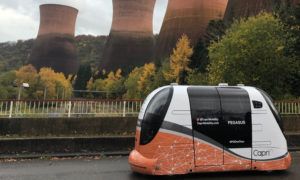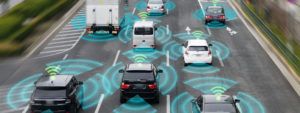UK-based telecommunications company O2 has signed an agreement to provide 5G connectivity for the testing of connected and autonomous vehicles (CAVs) in the world’s most advanced urban testbed, the Smart Mobility Living Lab (SMLL) in London.
SMLL is a government-backed CAV testbed based in the Royal Borough of Greenwich and the Queen Elizabeth Olympic Park, created with the aim of building safer, more intelligent and better joined-up transport systems. It comprises world leading expertise from across the transport and technology sectors including the UK’s Transport Research Laboratory (TRL), Cisco, DG Cities, London Legacy Development Corporation, Cubic Transportation Systems (CTS) and Loughborough University. O2 has now agreed to collaborate with SMLL to provide 5G connectivity to the testbed as part of the telecoms operator’s commitment to support businesses and projects looking to explore the potential of 5G in the mobility sector.
O2’s 3.4GHz 5G-ready spectrum will enable car manufacturers, self-driving technology companies, start-ups as well as other private and public organizations involved in the transport ecosystem to test both vehicle to vehicle (V2V) and vehicle to roadside infrastructure communications (V2I) in a real-world environment. Many transport experts believe 5G is the key to unlocking the potential of self-driving vehicles’ potential. There are three stand-out reasons for this: the extra speed of 5G; its ability to connect with many more devices at once; and a far lower latency, meaning data sent between two 5G devices is almost instantaneous. The high capacity of 5G also allows for vehicles to transmit large amounts of data, including 4K video, to intelligent cloud-based transport systems, which are expected to improve road safety and help traffic authorities to monitor and manage traffic flow.
A division of the Spanish Telefonica group, announced in June that it is preparing to test satellite safety systems for 5G driverless cars in Oxfordshire in partnership with the European and UK space agencies. This followed the news earlier this year that the company will use its 5G network to power CAV testing at the Millbrook Proving Ground in Bedfordshire. In July, the company started its ‘Smart Ambulance’ trial to revolutionize patient treatment and reduce hospital numbers by transforming vehicles into a unique remote consultation room.
 “We’re determined to help businesses of all sizes realize the potential of fifth-generation mobile technology. We know that the transport sector is going to be one of the key beneficiaries of 5G, and that the technology has the potential to reduce traffic congestion, as well as making journeys safer and more enjoyable,” said Brendan O’Reilly, O2’s chief technology officer. “That’s why we’re excited to be working with the teams at the Smart Mobility Living Lab, who are driving forward our understanding of how this next generation technology will fundamentally change the fabric of the cities in which we live and work, as well as creating entirely new methods of travel.”
“We’re determined to help businesses of all sizes realize the potential of fifth-generation mobile technology. We know that the transport sector is going to be one of the key beneficiaries of 5G, and that the technology has the potential to reduce traffic congestion, as well as making journeys safer and more enjoyable,” said Brendan O’Reilly, O2’s chief technology officer. “That’s why we’re excited to be working with the teams at the Smart Mobility Living Lab, who are driving forward our understanding of how this next generation technology will fundamentally change the fabric of the cities in which we live and work, as well as creating entirely new methods of travel.”
Paul Campion, TRL’s CEO, said, “5G is a technology that supports a successful rollout of self-driving cars in the UK. By working with industry leader O2, we are ensuring that SMLL is not just a real-world testing environment for self-driving cars today; we are future-proofing the testbed so that we can accelerate our customers’ research and development programs.”





